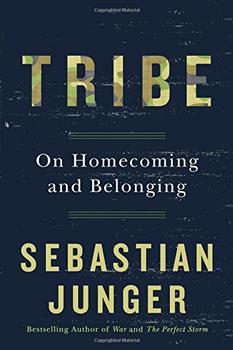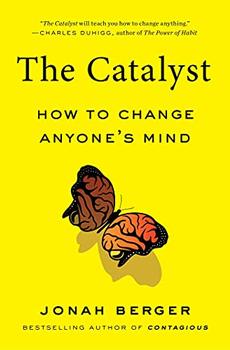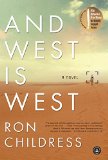Summary | Excerpt | Reviews | Beyond the book | Read-Alikes | Genres & Themes | Author Bio

On Homecoming and Belonging
by Sebastian JungerThere's a strain of American thought that has always celebrated the virtue of individualism, from Emerson's promotion of "self reliance" and Whitman's poetic plea to "filter things for yourself" to modern feminist author Naomi Wolf's call for "individual solutions to individual problems." The loner, standing against the crowd, is a potent, centuries-old icon in American culture.
But Sebastian Junger is having none of it:
Even if he or she is part of a family, that is not the same as belonging to a group that shares resources and experiences almost everything collectively. Whatever the advances of modern society—and they're nearly miraculous—the individualized lifestyles [they] spawn seem to be deeply brutalizing to the human spirit.
Junger, author of the best-selling The Perfect Storm and a handful of other non-fiction works, has written a book that calls into question the psychological fallout of a society that has moved from an almost primitive tribalism to a modern embrace of individualism and isolation. Well, there are really two books here: a generalized discussion about how members of modern American society have isolated themselves from each other at considerable peril, and the second (and more compelling), an argument for changing the way soldiers returning from battle are re-integrated into society.
The individuality-is-ruining-us thesis derives from Junger's review of other societies, much more tribal in nature (especially Native American culture, which he holds up as the prime example of the benefits of tribalism), that exhibit greater social cohesion, commitment to self-sacrifice for the good of the group, and overall happiness. Not having something to sacrifice yourself for is harmful to our collective psyches, he argues. Most especially he laments the erosion of ritual and ceremony that keeps young men from being formally initiated into a larger group. This loss often results in young males joining violent gangs and finding in their ethos of criminality, and even death, a feeling of integration into adult life: "These deaths can be thought of as one generation after another trying to run their own initiation rites because they live in a society that no longer does that for them." It's a profound observation, though Joseph Campbell, celebrated professor of myth and literature, made the same point thirty years ago in the best-selling book, and popular PBS series, The Power of Myth.
Junger's argument that war, natural disaster, and economic collapse help breed communitarianism and a robust sense of social dependence is no doubt true, although at least a few readers are likely to bristle at the implication when he notes that "What catastrophes seem to do...is turn back the clock on ten thousand years of social evolution. Self-interest gets subsumed into group interest because there is no survival outside group survival, and that creates a social bond that many people sorely miss." It's not the first time that Junger seems to suggest that what America could use is a good catastrophe to rouse our civic selflessness; he cites declining crime statistics and lower suicide rates in the wake of 9/11 as examples of how disasters pull us all together.
It's the catastrophe of war that most interests Junger, and when he turns his attention to the epidemic of PTSD—and the ways in which our society actually make the condition worse—he raises some provocative and useful points: "Studies from around the world show that recovery from war—from any trauma—is heavily influenced by the society one belongs to, and there are societies that make the process relatively easy. Modern society does not seem to be one of them." His thesis is that veterans returning from the theatre of war will have likely experienced a closeness with their fellow soldiers that sustained them through the horror of battle, and that once back home, that feeling of closeness, of belonging, of being essential, is missing in modern society. We've become too detached from each other. What soldiers miss when back home, he claims, "isn't danger or loss but the unity that these things often engender. There are obvious stresses on a person in a group, but there may be even greater stresses on a person in isolation."
All true, and all well documented by decades of psychological studies, many of which Junger cites. However, one might view more skeptically his argument that America's contentious political culture is a precipitating factor in the PTSD epidemic. Upon returning back home to the U.S. from war, "First there is a kind of shock at the level of comfort and affluence we enjoy, but that is followed by the dismal realization that we live in a society that is basically at war with itself. People speak with incredible contempt about the rich, the poor, the educated, the foreign-born, the president, or the entire U.S. government. It's a level of contempt that is usually reserved for enemies in wartime." That strikes me as hyberbole and perhaps even dangerous. A healthy and robust social debate is one of the hallmarks of American democracy, and while the current volume of our venting in post-election America might not show us at our best, something tells me that most of the social media sniping and talk-radio trashing does not quite rise to the level of vitriol directed toward the enemy in World War II or the Civil War.
The loss of traditional tribalism among human communities, he argues, not only hurts combat veterans but it also creates a warrior mentality in society, encouraging an "every man for himself" ethos. Decrying the rise of attacks by lone gunmen in America, Junger sees "murder and mayhem committed by an individual who has rejected all social bonds." The loss of a tribal sense of interdependence, trust, and respect doesn't just manifest itself in acts of violence, Junger argues, but in all sorts of corrosive ways in society, from average citizens regularly cheating on their taxes to insurance fraud, to the financial crisis of the latter part of the last decade, "when bankers gambled trillions of dollars of taxpayer money on blatantly fraudulent mortgages."
Junger is content to diagnose the problem as he sees it, and other than a couple of feel-good examples of "giving back" from a World War II vet and a businessman who volunteered to cut his salary to keep paying his employees, the book offers no substantive solutions to the problem of the loss of tribalism in modern American culture. I wish he had looked more closely at countries outside of the U.S.—Italy, for example—where the idea of "family" still implies a more cohesive social bond. Still, the evidence of a diminished sense of social cohesion in modern society is undeniable, and Tribe offers a compelling brief for those who long for the sense of community America once had—before it even became America.
![]() This review
first ran in the February 1, 2017
issue of BookBrowse Recommends.
This review
first ran in the February 1, 2017
issue of BookBrowse Recommends.

If you liked Tribe, try these:

by Jonah Berger
Published 2022
From the author of New York Times bestsellers Contagious and Invisible Influence comes a revolutionary approach to changing anyone's mind.

by Ron Childress
Published 2016
Winner of the prestigious PEN/Bellwether Prize for Socially Engaged Fiction, And West Is West is an inspired novel about two young people who learn, the hard way, about the devastating power of new technology to isolate us from the consequences of our actions.
Your guide toexceptional books
BookBrowse seeks out and recommends the best in contemporary fiction and nonfiction—books that not only engage and entertain but also deepen our understanding of ourselves and the world around us.